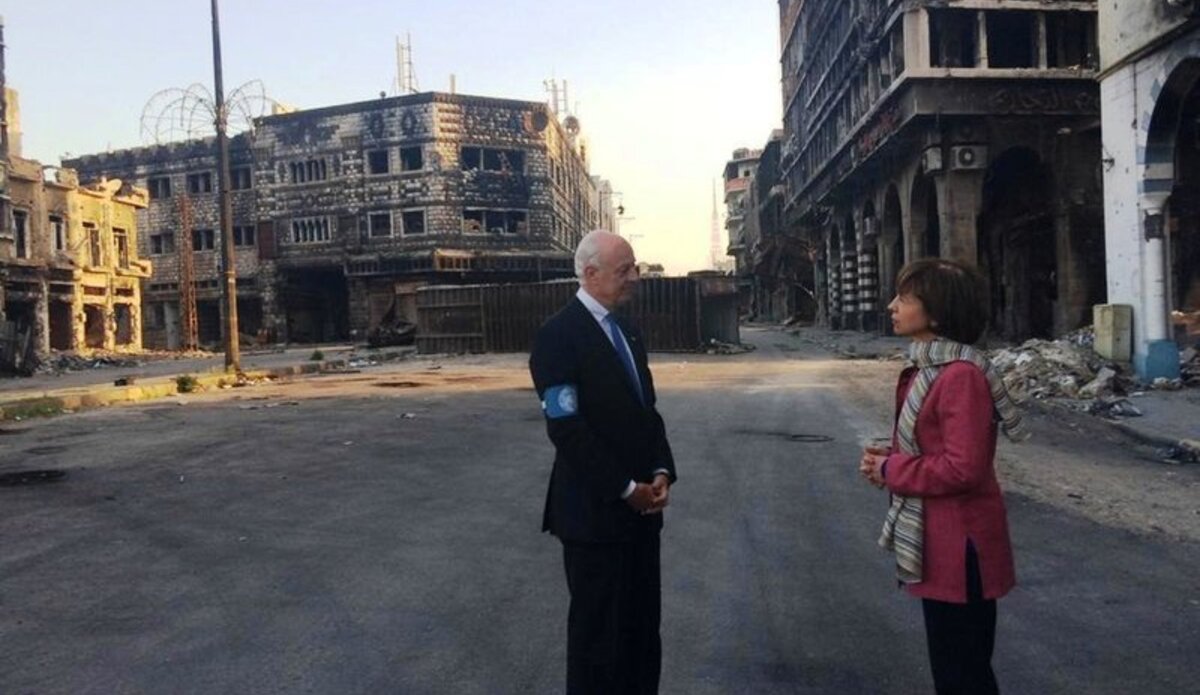DPA has been closely monitoring the quickly-evolving situation in Syria and the multifaceted conflict dynamics since protests erupted in March 2011. The UN-led talks in Geneva strive toward a credible political settlement in line with resolution 2254 (2015) and the Geneva Communiqué (2012).
In February 2012, the General Assembly passed a resolution 66/253 requesting the UN to join forces with the League of Arab States in support of a peaceful solution to the Syrian conflict through a political transition, this led to former UN Secretary-General Kofi Annan’s appointment as the Joint Special Envoy. In April 2012, the Security Council adopted resolutions 2042 and 2043 endorsing Annan’s six-point plan and establishing the UN Supervision Mission in Syria (UNSMIS) to monitor and support its implementation. However, the initial lull in hostilities that followed broad international consensus of the six-point plan was short-lived. In June 2012, Annan convened a meeting where key international and regional stakeholders adopted the Geneva Communiqué, a document which aimed to strengthen the implementation of the six-point plan and chart a political way forward. To this day, the Communique continues to provide the UN guidance on its mediation efforts toward a political transition. The Geneva Communique was endorsed by the General Assembly in resolution 66/253-B in August 2012 and by the Security Council in resolution 2118 in September 2013. Amidst increasing violence across the entire country, the Security Council was unable to renew the UNMSIS mandate beyond August 2012.
In August 2012, following the departure of Kofi Annan, the Secretaries-General of the UN and the Arab League appointed Lakhdar Brahimi as their new Joint Special Representative. Brahimi convened intra-Syrian negotiations in Geneva in January and February 2014, which aimed to provide space for the Syrian sides to agree on a full implementation of the Geneva Communiqué. While the parties agreed on an agenda (transitional governing body; violence and terrorism; national institutions; reconciliation) they could not agree on the sequence for negotiating these issues. Brahimi suspended the negotiations and did not extend his assignment beyond May 2014.
The Secretary-General appointed the UN’s current Special Envoy for Syria, Staffan de Mistura, in July 2014. Intense diplomatic engagement in 2015 between Russia and the US, and other key international stakeholders resulted in the establishment of the International Syrian Support Group (ISSG) and the adoption of Security Council resolution 2254 (2015). Resolution 2254 (2015) reiterated the endorsement of the Geneva Communiqué and set the Special Envoy’s mandate. The resolution established a timeline for a political transition, including negotiations on the establishment of a credible, inclusive, non-sectarian governance and a process and timeline for drafting a new constitution. It also called for free and fair elections, including the diaspora, pursuant to the new constitution and held under UN supervision.
Since January 2016, Special Envoy de Mistura has conducted a series of intra-Syrian negotiations with talks in late 2017 into 2018 focusing on two key aspects of resolution 2254: the schedule and process for drafting a new constitution and precise requirements for UN-supervised elections.
Since the beginning of the conflict, Syria has witnessed unprecedented devastation and displacement, compounded by the re-emergence of the use of internationally proscribed chemical weapons.
Impunity has been a hallmark of the Syrian conflict and has challenged one of the UN’s core values—accountability. This gap was initially addressed when on 21 December 2016, the General Assembly adopted resolution 71-248 to establish the International, Impartial, and Independent Mechanism (IIIM) to assist in the investigation and prosecution of the most serious crimes under international law, in particular the crimes of genocide, crimes against humanity and war crimes.
OCHA http://www.unocha.org/syria
OHCHR http://www.ohchr.org/EN/Countries/MENARegion/Pages/SYIndex.aspx
Commission of Inquiry of the Human Rights Council (COI) http://www.ohchr.org/EN/HRBodies/HRC/IICISyria/Pages/IndependentInternationalCommission.aspx
UNHCR http://data.unhcr.org/syrianrefugees/regional.php

